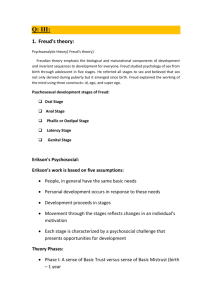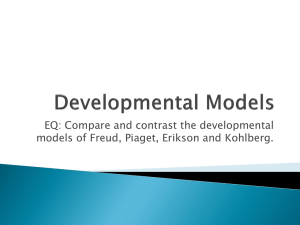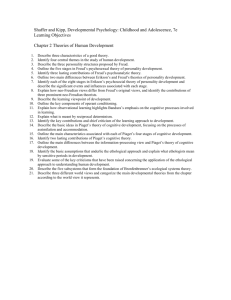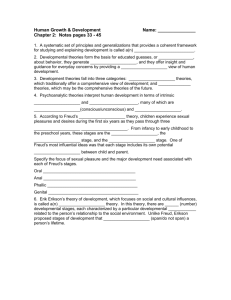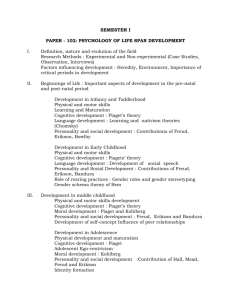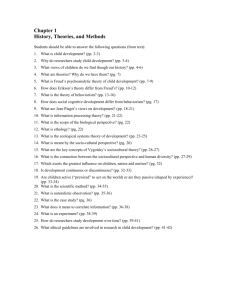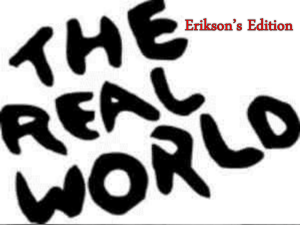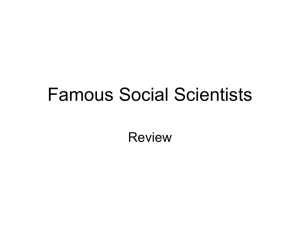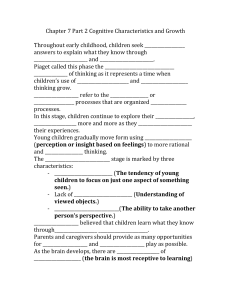(16): Understanding Theories of Development
advertisement
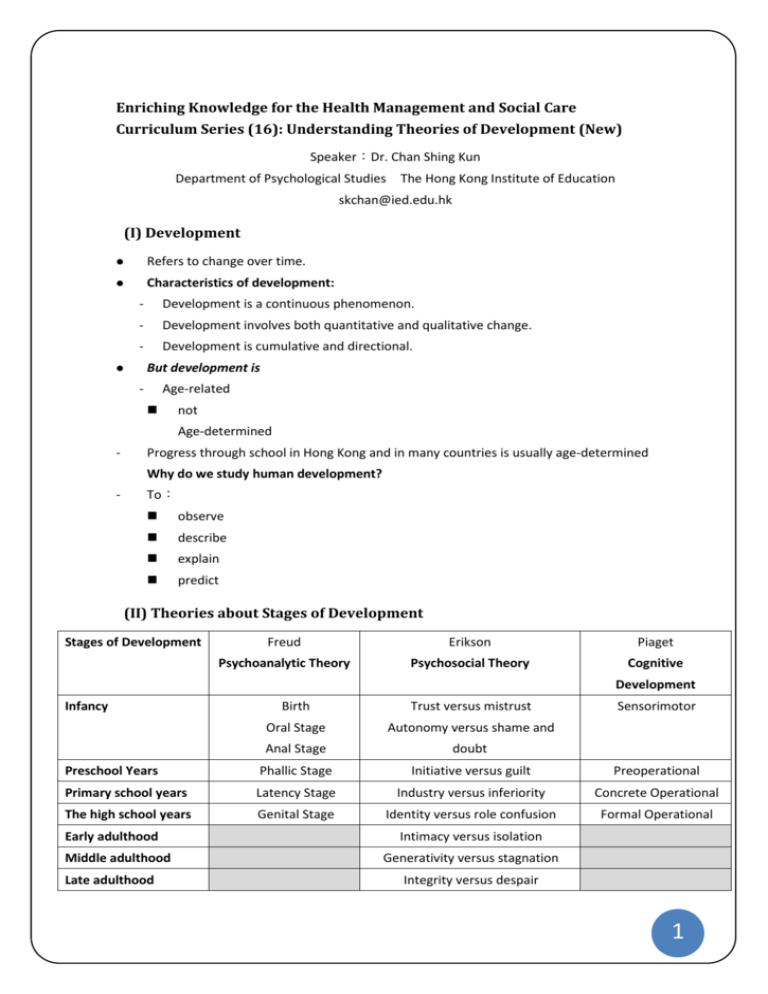
Enriching Knowledge for the Health Management and Social Care Curriculum Series (16): Understanding Theories of Development (New) Speaker:Dr. Chan Shing Kun Department of Psychological Studies The Hong Kong Institute of Education skchan@ied.edu.hk (I) Development Refers to change over time. Characteristics of development: - Development is a continuous phenomenon. - Development involves both quantitative and qualitative change. - Development is cumulative and directional. But development is - Age-related not Age-determined - Progress through school in Hong Kong and in many countries is usually age-determined Why do we study human development? - To: observe describe explain predict (II) Theories about Stages of Development Stages of Development Freud Erikson Piaget Psychoanalytic Theory Psychosocial Theory Cognitive Development Infancy Birth Trust versus mistrust Oral Stage Autonomy versus shame and Anal Stage doubt Preschool Years Phallic Stage Initiative versus guilt Preoperational Primary school years Latency Stage Industry versus inferiority Concrete Operational The high school years Genital Stage Identity versus role confusion Formal Operational Early adulthood Middle adulthood Late adulthood Sensorimotor Intimacy versus isolation Generativity versus stagnation Integrity versus despair 1 Infancy Prenatal development • 40 weeks of rapid growth At 4 weeks, 10 000 times size of ovum At 5 weeks major organs in 'adult' positions At 26 weeks can survive outside the womb At birth • • Wide range of reflexes: – Sucking, breathing, rooting reflexes obviously essential for survival – Grasping, Moro and stepping reflexes are not obviously so Physiological development is assessed by the presence and change in reflexes. Note: • Birth and reflexes will be interpreted and explained differently by Freud, Erikson and Piaget • Heredity & environment both influence development before birth, such as – Heredity: genetic diseases & chromosomal abnormalities; – Environment: influence of diet, drugs, birth complications. Sigmund Freud(1856 – 1939) i. Freud's Psychoanalytic Theory Developmental Sequence Six steps are identified in Freud's developmental sequence: birth oral stage anal stage phallic stage latency stage genital stage 2 ii. Infantile sexuality • A child has its sexual instincts and activities from the first; it comes into the world with them, • and, after an important course of development passing through many stages, they lead to what is known as the normal sexuality of the adult. iii. Freud's Psychoanalytic (or Psychosexual) Theory Structural Elements • The psyche or personality is composed of three developmental parts: – the id – the ego – the superego The id • the deepest and most primitive part of the psyche; • it is governed by the pleasure principle: it seeks pleasure; • is demanding and selfish; • is the seat of the instincts; • is also the source of psychic energy or libido avoids pain; The ego • the controlling agency of the psyche (personality) • it is governed by the reality principle; thus, the child must gradually learn to delay its food gratification when it is hungry; • it regulates the id and the instincts, i.e. reality governs the pleasure drive; • the ego is the basis for perception, memory, thought and action The superego • the moral agency of the psyche (personality); • it develops out of the ego based on models set by parents; • the superego is made up of two segments: - (a) ego ideal using parents' models of what is morally good - (b) conscience using parents' models of what is morally bad 3 iv. Freud 1. Birth 2. • the origin of all anxiety; • referred to as the 'birth trauma’ • child born into the world as a seething mass of instincts Oral Stage • Freud's focus is on the sucking reflex: focused on mouth, tongue, lips, gums; aim is for oral pleasure as a means to survival; (i.e. ID dominated) • period of ORAL DEPENDENCE (feeding and sucking) • followed by period of ORAL AGGRESSION (biting) • adult fixations from this stage: adult fixations of biting, chewing, eating, sucking, smoking, verbal abuse. 3. Anal Stage • second stage shifts to the anal region; • Freud's analysis revealed that anal stage behaviour was directed towards ownership, possession, and power to regulate and control which Freud related to toilet training; • It is a period of conflict between the child's instinctual urges and the society's pressure for cleanliness & self-control; • adult fixations from this stage: control of others, and obsessive cleanliness Erik Erikson (1902-1994) Erik Erikson's Psychosocial Theory • A neo-Freudian account of personality (or ego) development. Erikson's “Eight ages of man”: • i. A lifespan theory of human development Erikson's "Eight ages of man" • Trust versus mistrust • Autonomy versus shame and doubt • Initiative versus guilt • Industry versus inferiority • Identity versus role confusion 4 ii. iii. • Intimacy versus isolation • Generativity versus stagnation • Integrity versus despair At each stage: • Resolution of bi-polar conflict & • Establishment of new basic orientation to the social world. • Adoption of a positive orientation towards psychosocial development Erikson : Infancy 1. Stage One: Trust vs Mistrust • Dependable care leads to feeling of wellbeing and trust in the world as a safe place. • Inconsistent care and rejection leads to fear, mistrust and apprehension. • In contrast to Freudian view, Erikson's account allows that later positive experiences can help overcome (to some extent) negative influences of early experiences. 2. Stage Two: Autonomy vs Shame and Doubt • Support within realistic bounds allows for the development of autonomy (i.e. self-control) • while impatience and restrictiveness result in shame, and doubt in one's own capabilities. Jean Piaget (1896 – 1980) The four stages: I. • Sensorimotor • Preoperational (2 – 7 yrs old ) • Concrete Operational (7 – 11 yrs old ) • Formal Operational (11 yrs old and above ) (0 – 2 yrs old ) Stage I: Sensorimotor period (birth – 2 yr old) • A period of obvious sensori-motor adaptation to the infant’s environment. • Repeated reflex responses centred on the infant’s own body become habits. • develop from physical reflexes to thinking about objects • Repeated responses centred on external objects. • objects are treated as if they are permanent (Object Permanence ) 5 Preschool years Freudian View of the preschool years Phallic Stage • This stage involves a shift of cathexis from anal to genital zones of the body; • child's pleasure, interest and curiosity are directed towards its sexual anatomy, to the sexual activities of adults, to procreation, & to the physical differences between the sexes. Two complexes at the phallic stage: • the Oedipus and the Electra complexes • The Oedipus Complex refers to events regarding boys, attachment to mother in competition with father; • The Electra Complex refers to events regarding girls, attachment to father in competition with mother Resolution of crisis: • Identification with the same-sex parent • Sex-role learning Erikson: Pre-school years Stage Three:Initiative versus guilt • Positive value: – purposeful, spirited, enterprising behaviour. – Eager to find/develop what they can do: supported by freedom to try and to learn. – • Role of play Negative value: – Guilt from an overly strict ego; the result of being criticized, threatened, punished excessively. 6 Jean Piaget's Cognitive Developmental Theory Preoperational stage • Preschool years 2 - 5/7 years - age not critical • divided into two sub-stages: – Pre-conceptual – Intuitive thought Pre-conceptual 1. • Semiotic function This period is dominated by development of semiotic function (meaning attributed by signs and symbols). • representations involves the use of signifiers where mental events, words, actions or things stand for something else. • 2. • Semiotic function is readily observed in the child’s use of symbolic play. Egocentrism Children tend to adopt their own perspectives rather than view the world from the perspectives of others. e.g. – The three-mountain task – Parallel play Intuitive thought • so-named because the child’s thought seems to proceed by intuition based on perception rather than by clearly logical reasoning • Clearly observable in the lack of conservation skills shown by, say, preschoolers when pouring drinks, sharing objects or comparing sticks Role of pre-school • To nurture independence • Satisfy sexual curiosity (open toileting in pre-schools) • Build general skills or school related skills? • Socialization • Learn sex-appropriate behaviour • Support cognitive development • Language development • Ensure readiness for formal schooling 7 Primary school years Freudian View of the primary school years Latency • After the resolution of the Oedipus conflict, sexual content is submerged as children develop based on identification. • The focus of identification shifts from parents to the surroundings. Relationships between opposite sexes are comparatively distant. • At this stage, the child’s interest shifts to the outside world. Group activities are participated for fun, sport and same sex friendship. Pleasure mainly comes from the external. Freud suggested that Year 5 was a critical stage for one’s personality development. However, not all children were well-developed before latency. Erikson explains the primary school years Industry versus inferiority • Positive value: Get to know the life ethics and school regulations. Accept that effort leads to success. Possess the ego strengths such as productivity and enquiry. • Negative value: Inferiority due to lack of meaningful success: the result of being criticized, restricted: ‘don’t be a nuisance’ - ‘don’t make a mess’. • The peer group may reinforces feelings of or inferiority, especially when being teased or bullied. Piaget ‘s Cognitive development during the primary school years Concrete Operational Stage • 7- 12+ yrs • Development of logical thought based on the use of real objects Critical Abilities: • Classification • Seriation • Number Competency • Conservation 8 Conservation • continuous quantity 6-7 yrs old – Solids – liquids • number 6.5-7 yrs old • length, area 7-8 yrs old • weight 9- 12 yrs old • displacement volume 11-12 yrs old Three Cognitive Operations of Conservation 1. Identity 2. Reversibility 3. Combinativity (Compensation) (Importance of rational operational justifications over perception dominated judgements) The high school years Freudian View of adolescence Genital Stage • the stage of mature sexual/libidinal development; • directed towards biological reproduction • a mature system which balances • this stage is marked by ALTRUISM, UNSELFISH LOVE, RELIGIOUS COMMITMENT, id, ego, and superego DEVOTION TO IDEALS Erikson: adolescence Identity versus role confusion • Positive value: the development of self-identity; identity in the larger social world; interest in relationships, religion and other value systems, politics and society. • Capable to develop social networks outside family. • Negative value: Role confusion - unattached or confused in social identity and produce alienation. 9 Piaget ‘s Cognitive development during the high school years Piaget describes formal operational thinking as • hypothetico-deductive • propositional • combinatorial (III) Moral Development i. Meaning of Morality (i) manner, customs and folkways. (ii) The norm for good behaviour (iii) the ability to judge between right or wrong. Conscious human behavior can be divided into 3 stages (徐明心, 1992) moral concepts/ knowledge moral judgment moral action ii. Kohlberg, 1969, 1976: Three levels of six stage moral development Level I: Pre-conventional morality • Stage 1 - Punishment and obedience orientation Moral judgements and reasoning are initiated by the avoidance of punishment. Typically egocentric • Stage 2 : Individualism and instrumentalism Judgements based upon the satisfaction of one’s own needs or benefits. Realize that individuals have their own needs. Level II: Conventional morality • Stage 3 : Interpersonal concordance or “good boy – nice girl” orientation - Moral judgement aims at earning approval by being nice to the others, and living up to the standards and expectations of significant others. • Stage 4 : Law and order morality Judgement is based on one’s duty. Laws and social order should be obeyed. Anything that can benefit the society, the group or the organization is considered right. 10 Level III: Post-conventional morality • Stage 5: Social contract morality - Laws are a rational mechanism to serve the best interest of the majority. Can consider the conflict between moral issues and laws. Willing to sacrifice for the family, friendship, trust-worthiness and work. • Stage 6: Universal ethical principles Advocate the universality of ethical principle include justice, equality, humanity, self respect and respect for others, etc. Decision is made in accordance with self-chosen ethical principle even when the laws violate that principle. iii. Moral Education - Plus one principle and Moral dilemmas In each stage, students are confronted with talks, questions and moral dilemmas that belong to the next stage ahead. This will enable the students to exercise their moral thinking and judgement. Through being challenged by moral reasoning of the next stage, student might raise their level of moral reasoning. However, to go more than one level up will bring challenges that are beyond the students’ cognitive abilities to cope and this will be futile for their moral learning. References Newman, B. M., & Newman, P. R. (2009). Development through life :A psychosocial approach (10th ed.). Australia: Wadsworth/Cengage Learning. Newman, B. M. & Newman, P. R.著,郭靜晃、吳幸玲譯(1993):《兒童發展: 心理社會理論與實務》,台北,揚智文化事業股份有限公司。 Sigelman, C. K., & Rider, E. A. (2009). Life-span human development (6th Ed ed.). Belmont, Calif.: Wadsworth Cengage Learning. Sigelman, C. K., & Shaffer, D. R.著,游恒山譯(2001):《發展心理學》,台北, 五南圖書出版公司。 Sigmund Freud, five Lectures on Psycho-Analysis 1909. Retrieved on 10 June 2013, from http://www.anselm.edu/homepage/dbanach/h-freud-lectures.htm#one Slavin, R. E. (2009). Educational psychology :Theory and practice (9th ed.). Upper Saddle River, N.J.: Pearson/Allyn and Bacon Publishers. Slavin, R. E.著,王明傑、陳玉玲譯(2004),《教育心理學:理論與實踐》, 北京,北京大學出版社。 張春興 (2007) ,《教育心理學 :三化取向的理論與實踐》,台北,臺灣東華書 局股份有限公司。 11
